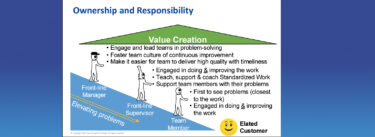It was the lead-up to the 2012 Lean Summit Africa in Cape Town and we were on a mission. We’d conspired to deliver a workshop never been seen before at the event: Green value stream mapping, quantifying waste, designing sustainability-focused experiments while capitalizing on financial opportunities. Enthused by our ideas, we got cracking with the preparation.
Number of people signed up? A whopping big zero.
Sure, there were last-minute registrations, but it was too little, too late. Deflated, we cancelled and one of us instead spent the day at the beach with a crisp sauvignon blanc in hand, spirits lifted (temporarily).
Message received? Green thinking was not on lean thinkers’ radar. There was little appetite to grow eco-lean mindsets and develop strategic green and lean thinking to change what was happening on the ground. As green activists, it felt like Monty Python’s Judean Popular Front: only one member, and not so popular. We retreated a little.
Making the Business Case for Lean–and Green–Thinking
But nearly a decade later we’re still at it. And the world has begun to change. As the planet’s environmental and social challenges become more obvious there is a greater awareness, There’s a solid business case for implementing lean thinking. There’s an equally strong case for implementing green thinking. understanding and acceptance of both the need for change as well as the potential such change offers. Some countries fare better than others, but societal focus on corporate responsibility means that environmental and social issues are no longer ignored and pushed aside in favour of “more important work.” More companies play their part to preserve the planet for future generations, while benefitting from the resultant economic benefits.
We believe that there’s a clear business case for lean thinkers that includes the following benefits:
- Taking care of talent by developing the psychological and physical conditions for people to confidently go about their work, and to safely push their learning boundaries. And then retaining them.
- Top line growth: when customers are satisfied, they keep coming back, they recommend you to others which brings new ones on board. Lean companies solve customer problems. They innovate, offer better features and delight with great service, boosting sales.
- Solving problems that make operations function better and safer yields bottom line perks. This work supports people to deliver better. It reduces the amount of near misses, safety incidents and catastrophes that otherwise create liabilities. Solving quality issues and improving first-pass yield directly raises productivity. Better flow and flexibility lowers inventory and reduces strain on working capital, allowing cash to be reinvested in areas of growth. Finding clever ways to capitalize on economies of repetition, without losing the chance to satisfy individual customer needs, is a win-win approach.
These benefits are measurable, tangible and boost the profit margins. The business case is clear: good for employees, good for customers and good for financial prosperity.
But the business case for implementing green thinking still isn’t clear to everyone. Or, at the least, it is not as likely to inform the lean strategy in many businesses. Some leaders ignore their company’s environmental and social impacts, focusing purely on the financial bottom line. Others would like to improve the business’ non-financial performance but fail to prioritize attempts to achieve this, leaving it for the future when there will be time and resources to expend on this. And that, we would suggest, is a pity, and a lost opportunity. In both cases, too strong an emphasis on short-term financial metrics is likely to have blinded these leaders to the benefits, financial and non-financial, that can accrue from green thinking.
The relationship between a company’s financial performance and its environmental and social impacts has been studied for many years, with more heat often being generated than light being shed on the issue (Waddock & Graves, 1997). There are those who would argue, for example, that it is only once a company achieves superior financial performance that it can afford to concern itself with environmental and social issues. But increasingly investors and managers alike are realizing that a company’s financial results are integrally tied up with how well environmental and social issues are included in the direction and focus of the organization.
Recognize These Four Fundamental Reasons to Think Green
A business case for deploying green thinking can be built on four main platforms (Carroll & Shabana, 2010).
First, that of cost and risk reduction. Proactive management of, for example, effluent systems can both reduce treatment costs and render potentially onerous interventions by regulators less likely.
Investors and managers alike are realizing that a company’s financial results are integrally tied up with how well environmental and social issues are included in the direction and focus of the organization.Second, the opportunity to gain competitive advantage. “We’re in business to save our home planet,” trumpets the outdoor apparel company Patagonia; by differentiating themselves from their competitors through their environmental activism they are able to attract like-minded customers who are prepared to pay premium prices for their wares. Or, differentiating by innovating offerings customers don’t even know they need yet, using neat design capability that builds them green to begin with.
Third, green thinking can enhance a company’s reputation and legitimacy. Attracting skilled talent with growth mindsets is essential for a company’s long-term performance, and an increasingly environmentally-aware workforce is often looking to serve in a company that exemplifies good green practices.
Fourth, the recognition of differing stakeholder demands may identify opportunities for synergistic value creation. The doyenne of management thinkers, Peter Drucker, wrote of how businesses can turn social problems into economic opportunities and into economic benefits. It is certainly possible to do well by doing good.
There’s a solid business case for implementing lean thinking. There’s an equally strong case for implementing green thinking. The challenge, but more importantly the opportunity for business, lies in bringing them together. A business creates value by solving customer problems while delivering results for the organisation. Our world suffers from a multitude of environmental and social problems. Eco-Lean thinking has the potential to satisfy customers with well-designed and responsibly produced goods and services that solve or at the least mitigate the effects of these problems. At the same time it can reduce costs and long term risks, freeing up cash for investing in next generation solutions. This is the thinking that will serve tomorrow’s customers and the companies that serve them.





